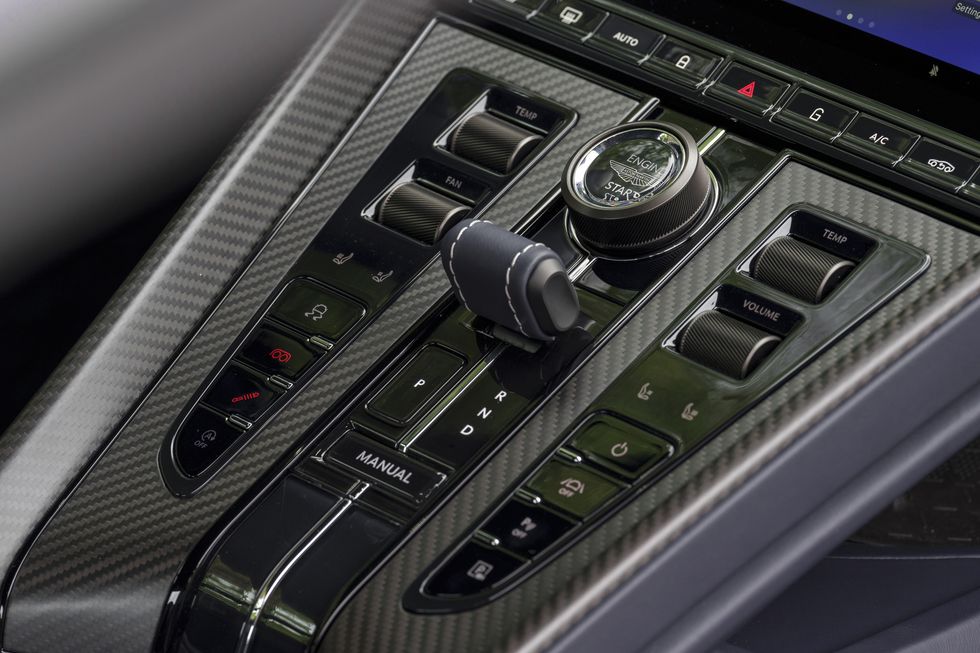2024 Aston Martin DB12 Is Fast and Fab

The Route Napoléon, which climbs north from the French Riviera to Grenoble, is widely considered one of the best driving roads in Europe, with a spectacular collection of narrow switchbacks and high-speed curves connected by brief straights. Much of it runs through national parkland, so traffic is light. It’s hardly a secret, though, and you’ll find groups of motorcyclists, driving tour groups, and—inevitably—campers also on the route. The ideal car for the Route Napoléon is one that’s tight and responsive in the twisties, poised through the fast curves, and with deep reserves of power in order to rip past dawdlers in the brief passing zones and roar triumphantly through the valleys. Something like the Aston Martin DB12.
The DB12 is a big car, and it feels plenty wide when you’re threading it along the narrow streets of the Côte d’Azur. Fortunately, the steering, which has been revised for greater precision both on- and off-center, makes placing this car easy. It’s the same quickness as before—2.4 turns lock to lock—and the ratio is fixed, which aids predictability. The level of power assist varies with speed and drive mode, but not wildly so. On-center precision was also a key quality in the design of the DB12-specific Michelin Pilot Sport 5S tires (275/35-ZR21 up front, 325/30-ZR21 at the rear).
So, too, was grip, and the DB12 has plenty. Pushing it as hard as we dared, it was impossible to upset this chassis—even when surprised by a tightening blind corner or suddenly booting the accelerator powering out of a curve. Aston claims 52 percent of the car’s mass rides on the rear wheels, and the DB12 feels incredibly balanced, with eager turn-in and little front-end push.
Chassis tuning for the new DB12 was undertaken with the goal of preserving ride quality but sharpening handling. The three main drive modes—GT, Sport, and Sport+—are joined by the new Wet and Individual modes. There are also nine levels of traction control once you switch off ESC (although that capability wasn’t active on the pre-production cars we drove). Director of vehicle performance Simon Newton talks about wanting to allow the car to “breathe,” which meant tuning the new Bilstein DTX adaptive dampers to allow some vertical motion even in the firmest setting. That firmest setting does preserve a measure of ride quality—more so than most Mercedes-AMG or BMW M cars in their max-attack mode.
The biggest mechanical change from DB11 to 12 is under the hood. The twin-turbocharged 4.0-liter V-8 again hails from AMG but is much brawnier than the DB11’s. Larger turbochargers, revised cam profiles, and a higher compression ratio push output to 671 horsepower and 590 pound-feet of torque, an additional 143 horses and 77 pound-feet. The new V-8 also tops the previously available V-12’s 630 horses and 516 pound-feet. (The V-12 isn’t currently on offer for the DB12, but Aston insiders hint that it could make a return.)
As it is, the V-8 certainly doesn’t disappoint. The engine’s fat torque band—the peak runs from 2750 to 6000 rpm—means the turbo V-8 is brutally strong throughout the rev range. And does this engine pack a punch. Aston quotes a 60-mph time of 3.5 seconds, but on the move, the DB12 seems even quicker. Out on the Route Napoléon, flooring the right pedal sent the car hurtling toward the next corner, and it made even the diciest passing opportunities suddenly viable. Our only quibble is the aggressive throttle mapping in Sport+ mode.
An engine that can punt a car forward with the force of this V-8 requires brakes that are equally forceful when reining a car in. The firm, reassuring left pedal in our DB12 squeezed carbon-ceramic rotors that were well up to the task. A new option, they save nearly 60 pounds over the standard iron stoppers, although they sometimes emit a faint squeal under light applications. The beefy rotors are visible through new, 21-inch wheels (9.5 inches wide up front, 10.5 inches at the rear). The wheel size is an increase from 20 inches in the DB11, yet the new forged wheels are collectively lighter by some 17 pounds.
The DB12 again uses a ZF eight-speed rear-mounted transaxle, and the ratios are the same as before. The final-drive ratio is 13 percent shorter, however, to aid in-gear acceleration, so calls for more midrange thrust often can be answered without downshifting. Aston has moved the large shift paddles from the column to the steering wheel, but you won’t have much need for them, so intuitive is this gearbox. Regardless of mode, it was amazingly prescient with its downshifting into corners and holding on to a gear when accelerating hard out of them. In the opposite scenario, when motoring gently through a busy town center or at parking-lot speeds, this torque-converter automatic exhibits none of the jerky hesitation that can occur with a dual-clutch gearbox.
Aston Martin

Aston Martin
The Route Napoléon isn’t much of a place for stylin’ and profilin’, but the French Riviera certainly is, and in that regard, the DB12 easily holds its own, though onlookers may not be able to tell it from its predecessor. Look at the DB12, and you’d think that—kind of like Fonzie checking out his perfect ducktail in the mirror and just putting his comb back in his pocket—Aston Martin’s designers rolled a DB11 into the studio and decided, “Eh, we really can’t improve upon that.” Actually, Aston chief creative officer Marek Reichman claims that most of the body panels are new or altered (the doors carry over, and the roof is from the DBS). The look is so similar, though, that the DB12 giveaways are mostly in the details: a larger grille that raises the nose, reshaped headlamps, a more prominent front splitter, and new sideview mirrors with minimalist housings perched on reshaped arms.
The near-identical body is draped over Aston’s bonded and riveted aluminum structure, tweaked for DB12 duty. Changes to the engine crossbrace, the front crossmember, the rear bulkhead, and the underbody trays have inched up the structural rigidity by a claimed 7 percent. The front track is fractionally wider (0.2 inch) and the rear slightly more so (0.9 inch).
Whereas Aston strived for continuity outside, that was not the case with the interior, where it replaced the previous poofy dash with a slimmer unit that makes the front compartment feel somewhat more spacious, although the greenhouse (which is unchanged) remains quite shallow. Three different seats are on offer: Our car had the midrange Sport Plus seats, which had plenty of lateral support, but the controls on the side of the console are somewhat fiddly. As before, token rear seats are sized for a briefcase or backpack rather than a human being. Fragrant Bridge of Weir leather and Alcantara covered almost every interior surface of the car we drove, which also featured carbon-fiber trim, although buyers face a plethora of choices.
Aston has binned the Mercedes-sourced infotainment system from the DB11 in favor of a new unit designed in-house. The screen, now fully integrated into the ramp-like center console, may seem undersized at 10.3 inches, but it looks good, and the home screen shows multiple functions at once, including climate-control shortcuts such as “warm hands.” Apple and Android smartphone mirroring are present and wireless. And the system is set up for over-the-air updates.
Happily, Aston didn’t go full touchscreen in a misguided quest for modernity, instead preserving the tactility of high-quality switchgear, including roller switches for temperature, fan speed, and audio volume, plus a smattering of buttons for major driving aspects (damper firmness, exhaust volume, and stability control), as well as the parking camera and some climate functions. Touch-sensitive nubs on the steering-wheel spokes are similar to Mercedes and are no better here. You select the drive mode via a large dial on the center console with the start/stop button at its center. The wireless smartphone charging mat is located on the console’s open lower tier, which may cause some anxiety for those who don’t like their phone out of sight; a wired connection can also be found inside the center armrest.
Aston Martin points out that in recent times, a wholesale model change has been accompanied by a plus-two increase in model designation: DB7 to DB9, DB9 to DB11. (The ultra-limited DB10 apparently doesn’t count.) The new car’s DB12 nameplate, along with its continuity in appearance, tells you that this is more of a comprehensive upgrade. But it’s one that puts this Aston at the pinnacle of the world’s high-glam sports tourers, and it makes the DB12 an ideal machine for taking on one of Europe’s most celebrated roads.
Arrow pointing downArrow pointing down
Specifications
Specifications
2024 Aston Martin DB12
Vehicle Type: front-engine, rear-wheel-drive, 2+2-passenger, 2-door coupe
PRICE
Base: $248,086
ENGINE
turbocharged and intercooled DOHC 32-valve V-8, aluminum block and heads, direct fuel injection
Displacement: 243 in3, 3982 cm3
Power: 671 hp @ 6000 rpm
Torque: 590 lb-ft @ 2750 rpm
TRANSMISSION
8-speed automatic
DIMENSIONS
Wheelbase: 110.4 in
Length: 186.0 in
Width: 78.0 in
Height: 51.0 in
Trunk Volume: 9 ft3
Curb Weight (C/D est): 4100 lb
PERFORMANCE (C/D EST)
60 mph: 3.3 sec
100 mph: 7.5 sec
1/4-Mile: 11.1 sec
Top Speed: 202 mph
EPA FUEL ECONOMY
Combined/City/Highway: 17/14/22 mpg

Deputy Editor, Reviews and Features
Joe Lorio has been obsessed with cars since his Matchbox days, and he got his first subscription to Car and Driver at age 11. Joe started his career at Automobile Magazine under David E. Davis Jr., and his work has also appeared on websites including Amazon Autos, Autoblog, AutoTrader, Hagerty, Hemmings, KBB, and TrueCar.







